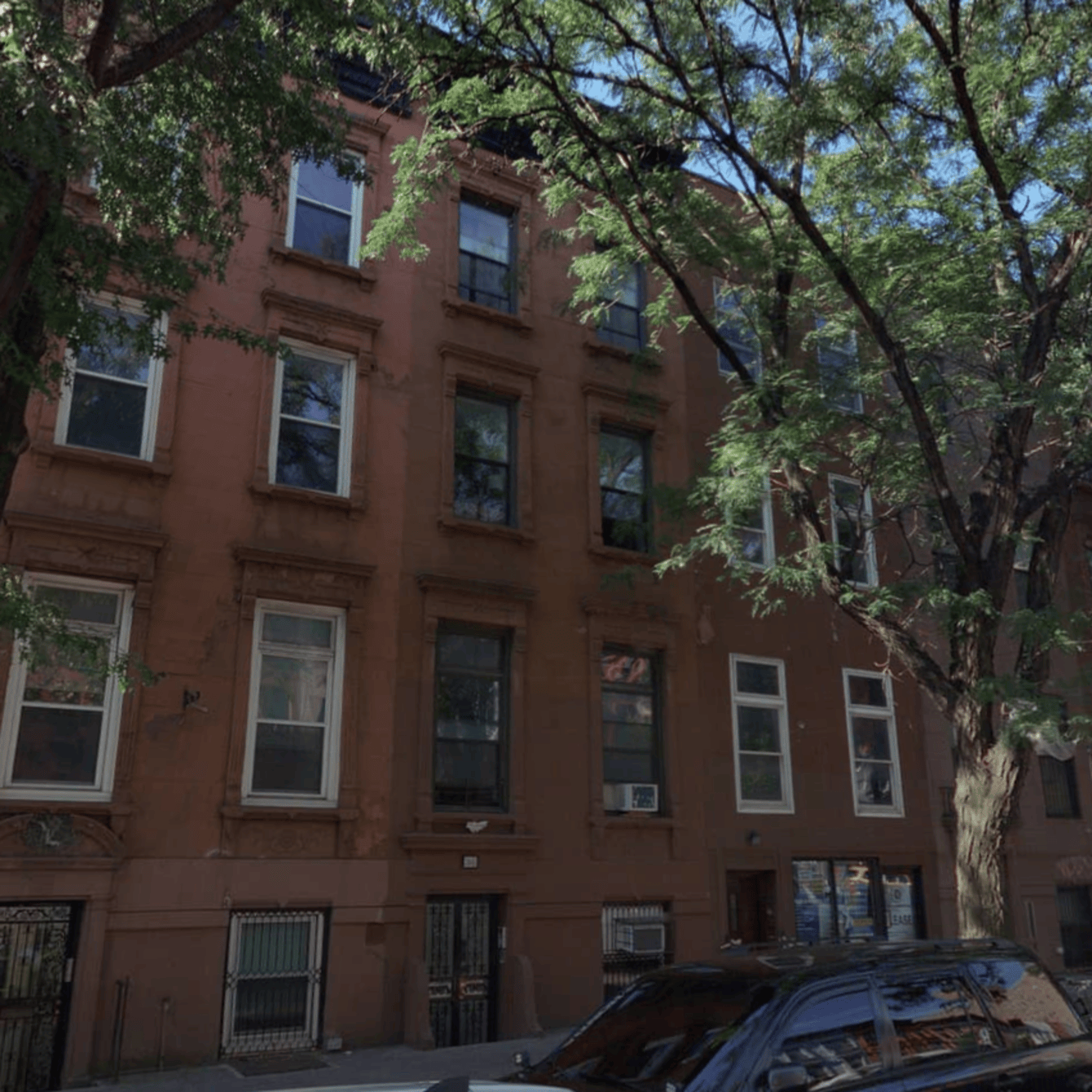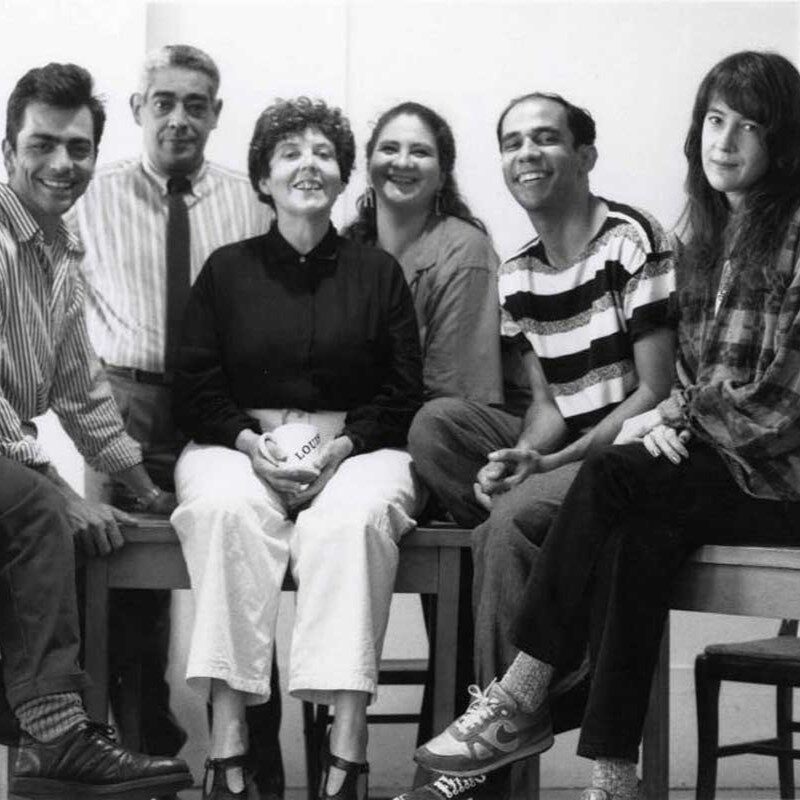
Víctor Fragoso Residence
overview
Víctor Fragoso was one of the first Puerto Rican poets and playwrights whose work focused on issues of gender, homosexuality, and the life of the Puerto Rican diaspora in the United States.
Fragoso wrote and directed his two final plays, La era latina (The Latino Era) and First Night Out, in his third-floor apartment in this building in El Barrio, where he lived from 1980 until his death in 1982.
History
Poet and playwright Víctor Fragoso (1944-1982) was born Víctor R. Fernández-Fragoso in San Juan, Puerto Rico (in adulthood, he opted to use his mother’s last name, Fragoso, instead of his father’s, Fernández, because of his close relationship with and admiration for her). After graduating with a degree in biology from the University of Puerto Rico, Fragoso left for New York for a research assistantship at the Memorial Sloan Kettering Cancer Center. (While never mentioned explicitly by him, family members have said that Fragoso was motivated to leave Puerto Rico because of his sexual orientation). His interest in poetry began as a teenager, and he later won poetry awards in Puerto Rico (1965) and New York (1967).
I started writing poetry when I was sixteen years old. My first poem took me by surprise. I discovered something that I did not understand well at the time. From that point on, writing poems turned into a daily ritual.
In 1967, Fragoso left Sloan Kettering and started his graduate studies at the University of Connecticut, earning a Ph.D. in Hispanic Literature in 1978. He also worked as a poet and playwright in New York and New Jersey while teaching, beginning in 1970, as an Assistant Professor of Spanish at Livingston College, a residential college at Rutgers University. That same year, he was selected to join the Committee of Puerto Rican Studies, where he designed and taught the first-ever course on Puerto Rican literature at Rutgers. Fragoso wrote and directed plays for theater companies mainly catering to the Latino community. Most of his collaborations took place with Teatro Dúo Theater, founded by Cuban playwright Manuel Martín, Jr. and Cuban actress Magali Alabau.
In 1972, Fragoso founded Grupo Guazábara with some of his Livingston students as a theater company dedicated to promoting playwriting and acting among Puerto Rican youth in New Jersey. Students wrote plays reflecting the lives of Puerto Rican families on the East Coast and presented these at public spaces in New Jersey, Pennsylvania, and New York. In the 1970s, Fragoso also published his first poetry anthology, El reino de la espiga: Canto al coraje de Walt y Federico (1973; translated as The Kingdom of the Spike: A Song of Courage by Walt and Federico), followed by the bilingual anthology Ser islas/Being Islands, published by Manuel Ramos Otero’s El Libro Viaje in 1976.
After living in several locations on Manhattan’s west side — including 53 West 87th Street (1970), 327 West 83rd Street (1971), 429 West 24th Street (1972), 140 Waverly Place (1973-1976), and 200 West 15th Street (1976-1979) — Fragoso moved to an apartment in El Barrio at 346 East 116th Street in January 1980, the building owned by Rutgers colleague María Josefa Canino. From here, he worked on his two final plays. La era latina (1980; translated as The Latino Era) was co-written with Cuban playwright Dolores Prida in Spanish, English, and Spanglish to cater to a range of audiences in various New York City neighborhoods where the play was performed. In 1981, this play earned Fragoso and Prida a special mention in the First International Third World Theater Competition. Fragoso’s last play, First Night Out: The Basic Training of a Bag Lady (1981), was his first and only one to be written originally and entirely in English. The play, one of his last works, looked at issues beyond the Puerto Rican community alone, tackling aspects of homelessness and sexual harassment. In 1980, Fragoso was among the first to join the Hispanic Playwrights-in-Residence Laboratory at International Arts Relations (INTAR) in Manhattan.
By the summer of 1981, Fragoso started getting sick and was initially diagnosed with Kaposi’s sarcoma. He continued teaching and directing plays until his death at age 37, two days shy of his birthday, due to AIDS-related complications.
Most of Fragoso’s work remains unpublished, including an unfinished anthology on the then-new generation of Dominican poets. After his death, Rutgers University established the Víctor Fernández-Fragoso Award, which continues today. Despite his premature death, Fragoso’s contributions to Puerto Rican theater in New York City have recently received focus in Puerto Rico and beyond, showcasing his influence in highlighting various issues of the Puerto Rican diaspora.
Entry by Andrés Santana-Miranda, project consultant (December 2024).
NOTE: Names above in bold indicate LGBT people.
Building Information
- Architect or Builder: Emil Schultze
- Year Built: 1881
Sources
Consuelo Martínez-Reyes, “Gender, Homosexuality, the Diasporic Experience, and Other Key Themes in Víctor Fragoso’s Theater,” CENTRO Journal 29, no. 2 (Summer 2017): 104-133.
Consuelo Martínez-Reyes, Not the Time to Stay: The Unpublished Plays of Víctor Fragoso (New York: Center for Puerto Rican Studies, 2018).
Daniel Torres, “De la metáfora silenciona de Víctor Fragoso a la metáfora contagiosa de Manuel Ramos Otero y a la poética de la ira de Alfredo Villanueva Collado,” Revista Cruce (December 2023): 66-75.
Dinorah Cortés Vélez, “Víctor Fragoso y el arte de ser islas: entrevista a la Dra. María Josefa Canino,” El Post Antillano, October 25, 2014, bit.ly/3C9MTZ2.
Vannesa Droz, “Testimonio de la labor literaria de Víctor Fragoso,” El Mundo, February 11, 1982, 6-B.
Víctor Fernández Fragoso Papers, Archives of the Puerto Rican Diaspora, Center for Puerto Rican Studies, Hunter College, CUNY.
Víctor Fragoso, manuscript titled “Autobiográfico,” undated, Box 1, Folder 4, Víctor Fragoso Papers, Archives of the Puerto Rican Diaspora, Center for Puerto Rican Studies, Hunter College, CUNY. [source of pull quote].
Do you have more information about this site?
This project is enriched by your participation! Do you have your own images of this site? Or a story to share? Would you like to suggest a different historic site?







